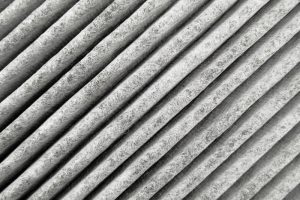
If you’re asking this question, then we’re glad you found our page–because you certainly do need a qualified HVAC professional to help you with your filter replacement. The higher the MERV rating of a filter– that is, the Minimum Efficiency Reporting Value– the tighter the weave of the fiber. And the tighter the weave, the smaller particles can be caught.
Not all HVAC filters are created equal. The purpose of this filter that comes standard in your HVAC systems is to protect the system from debris that can get sucked into it and harm its sensitive components. So it sounds like a higher MERV rating would be the best to protect your HVAC system, right?
Well…. not quite. And we’ll get into the reasons why below. First, let’s explain further what MERV ratings are. Read on!
What Does “Minimum Efficiency Reporting Value” Mean?
This rating measures how small or fine the filtration is in your filter. In other words, it measures how small the particles are that the filter is capable of trapping.
The MERV rating scale goes from 1 to 20, and in most homes and other residential dwellings, MERV filters tend to fall into the 1-13 range, although the filters used in most HVAC systems that actually benefit air quality are not often below MERV 8. The highest-rated MERV filters are in the 14 to 20 range and are most often used in both healthcare settings as well as industrial facilities that need extremely fine filtration.
“Wait, That Sounds Great… Why Should I Avoid That?”
Because there is actually a potential downside to a tighter filter weave, like with a HEPA filter with a MERV 14 or higher. The tighter the weave, the more resistance there is against airflow. So while harmful particles might not be able to get through, the air won’t get through either. This means that your HVAC systems will keep trying to reach the desired setting on your thermostat, but won’t be able to effectively draw out the hot air from your home through your AC or effectively return enough cooled air to reach that desired temperature.
If you want to find the best air filtration system for your home that will both eliminate contaminants and allow your HVAC system to work as efficiently as possible, you’ll want to talk to us about your indoor air quality options.
As we stated above, the best residential filters are MERV 8 to about 12 or 13. These filters are capable of stopping particles from 1.0 to 3.0 microns in size, and in most homes, this is plenty sufficient for handling most typical contaminants, from dust to auto emissions and VOCs (Volatile Organic Compounds). Going to a MERV 14 or above puts the filter in the commercial category, and they simply aren’t necessary nor are they effective for a residential HVAC system.
We’re happy to answer any questions you may have about MERV filters, air filters in general, and other indoor air quality solutions for your home. Please don’t hesitate to reach out to our team!
Boehmer Heating & Cooling is your trusted resource for Pittsburgh HVAC services and more. Contact us today!

